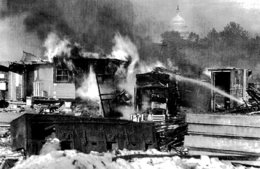Bonus Army
|
|
The Bonus Army or Bonus March or Bonus Expeditionary Force was an organization of 15,000 World War I veterans, their families, and other affiliated groups, who demonstrated in Washington, DC during June, 1932 seeking immediate payment of a "bonus" they believed had been promised by the Adjusted Service Certificate Law of 1924 for payment in 1945.
The Bonus Army massed at the United States Capitol on June 17 as the U.S. Senate considered a bill that would give them certain benefits. Most camped in makeshift camps or shacks (similar to Hoovervilles) on the Anacostia Flats, a swampy, muddy area in Southeast D.C., across the Anacostia River from the federal core of the city. The protestors had hoped that they could pressure Congress to change the law and make immediate payments, which would have provided relief for the marchers, many of whom were unemployed due to the Great Depression. The bill passed the House of Representatives, but was blocked in the Senate.
After the defeat of the bill, Congress appropriated funds to pay for the marchers' return home, most did not accept. On July 28, Washington police attempted to remove some former marchers from a federal site where construction was scheduled to proceed under the government's public works program. Agitators assaulted the police with blunt weapons, wounding several of them. After the police retreated, the District of Columbia commissioner asked president Herbert Hoover for federal troops to assist the police in removing the marchers.
The marchers were cleared and their camps were destroyed by federal cavalry troops under the command of General Douglas MacArthur, in a possible violation of the Posse Comitatus Act of 1878. This is debatable since the incident took place in federal territory rather than state lands. Dwight D. Eisenhower, as a member of MacArthur's staff, had strong reservations about the operation, and George Patton was also ordered to take part in the operation. Tanks and troops with rifles were sent into the Bonus Expeditionary Force's camps. Hundreds of veterans were injured, several were killed, such as William Hushka and Eric Carlson, a wife of a veteran miscarried, and other such casualties were inflicted. The army burned down the BEF's tents and used tear gas. Reports of US soldiers marching against their peers did not help Hoover's re-election efforts; neither did his open opposition to the Bonus Law due to financial concerns. After the inauguration of Franklin D. Roosevelt in 1933, a section of the Bonus Army regrouped in Washington to restate their claims to the new President. Roosevelt sent his wife Eleanor to talk with them. Roosevelt also rejected their claims until near the end of his presidency.
Further reading
- Paul Dickson and Thomas B. Allen, Bonus Army: An American Epic, Walker and Company (January 1, 2004), hardcover, 370 pages, ISBN 0802714404
External Link
- NPR story about the Bonus Army, including archival newsreels (http://www.npr.org/templates/story/story.php?storyId=4494446)

